OUR PRODUCTS
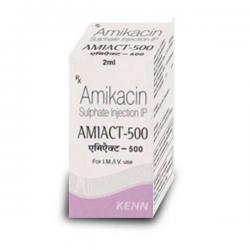
Amiact 100, 500 Inj./ Mg
Product Details :
AMIACT is indicated in the short-term treatment of serious infections due to susceptible strains of Gram-negative bacteria, including Pseudomonas species, Escherichia coli, species of indole-positive and indole-negative Proteus, Providencia species, Klebsiella-Enterobacter-Serratia species, and Acinetobacter (formerly Mima-Herellea) species and Citrobacter freundii.
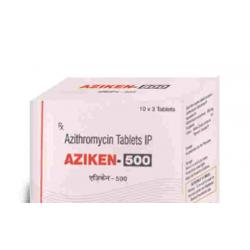
Aziken 250, 500 Tab.
Product Details :
AZIKEN is indicated in the treatment of:
- Upper respiratory tract infections (including ear, nose and throat infections): Tonsillitis, sinusitis, otitis media and pharyngitis.
- Lower respiratory tract infections: Community acquired pneumonias, acute bacterial exacerbations of chronic bronchitis, chronic obstructive pulmonary disease, bronchitis due to Haemophilus influenzae, Moraxella catarrhalis or Streptococcus pneumoniae.
- Genitourinary tract infections (including sexually transmitted diseases): Urethritis, prostatitis, cervicitis, cervico-vaginitis and salpingitis due to N. gonorrhoeae and C. trachomatis. Genital ulcer disease (chanchroid) in men due to Haemophilus ducreyi.
- Skin and skin structure infections: Folliculitis, furuncles, carbuncles, impetigo, pyoderma, infected ulcer, infected dermatitis, cellulitis and erysipelas due to S. aureus, S. pyogenes or S. agalactiae.
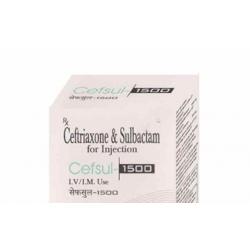
Cefsul 1500, 750, 375 Inj.
Product Details :
CEFSUL is mainly indicated in the following conditions:
- Lower respiratory tract infections and community acquired pneumonia
- Acute bacterial otitis media
- Skin and skin structure infections
- Urinary tract infections
- Uncomplicated gonorrhea
- Pelvic inflammatory disease
- Bacterial septicemia
- Bone and joint infections
- Intra-abdominal infections
- Bacterial meningitis
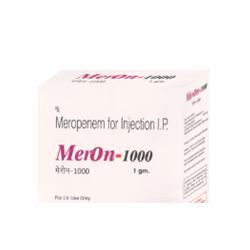
Meron 1000 Inj.
Product Details :
MERON is indicated for treatment, in adults and children, of the following infections caused by single or multiple susceptible bacteria and as empiric therapy prior to the identification of the causative organisms:
-
Lower Respiratory Tract Infections
-
Urinary Tract Infections, including complicated infections
-
Intra-abdominal Infections
-
Gynaecological Infections, including postpartum infections
-
Skin and Skin Structure Infections
-
Meningitis
-
Septicaemia
-
Empiric treatment, including initital monotherapy, for presumed bacterial infections in host-compromised, neutropenic patients
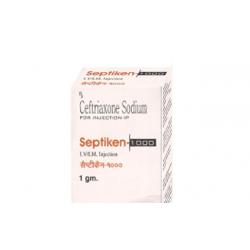
Septiken 250, 500, 1000 Inj.
Product Details :
Infections caused by pathogens sensitive to ceftriaxone such as
Sepsis
meningitis in neonates and infants
perioperative prophylaxis of infections
renal and urinary tract infections
respiratory tract infections, particularly pneumonia, and ear, nose and throat infections.
infections of the bones, joints, soft tissue, skin and of wounds.
abdominal infections (peritonitis, infections of the biliary tract).
uncomplicated gonorrhea
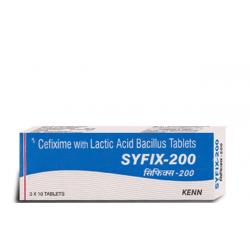
Syfix 200 Tab.
Product Details :
Cefixime is indicated in the treatment of the following infections
- Typhoid fever
- Uncomplicated Urinary Tract Infections
- Otitis Media
- Pharyngitis and Tonsillitis,
- Acute Bronchitis and Acute Exacerbations of Chronic Bronchitis
- Uncomplicated gonorrhea
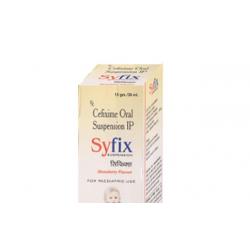
Syfix Dry Syrup
Product Details :
Cefixime is indicated in the treatment of the following infections
- Typhoid fever
- Uncomplicated Urinary Tract Infections
- Otitis Media
- Pharyngitis and Tonsillitis,
- Acute Bronchitis and Acute Exacerbations of Chronic Bronchitis
- Uncomplicated gonorrhea
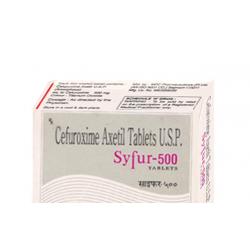
Syfur Tab./cefuroxime Axetil 250 & 500 Mg
Product Details :
URTI & ENT infection: e.g. Otitis media, sinusitis, tonsillitis and pharyngitis
LRTI: Pneumonia, acute bronchitis and acute exacerbation of chronic bronchitis
Genito–urinary tract infection: e.g. Cystitis, urethritis, pyelonephritis Gonorrhoea, acute uncomplicated gonococcal urethritis and cervicitis
Skin and soft tissue infections: e.g. Pyoderma, impetigo and furenculosis
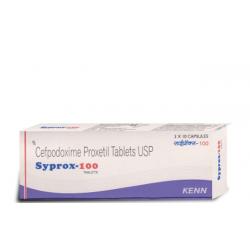
Syprox Tab./cefpodoxime Proxetil 100 & 200 Mg
Product Details :
SYPROX Tablets are indicated for the treatment of patients with mild to moderate infections caused by susceptible strains of the designated microorganisms in the conditions listed below:
Acute otitis media caused by Streptococcus pneumoniae , (excluding penicillin-resistant strains), Streptococcus pyogenes, Haemophilus influenzae (including beta-lactamase-producing strains), or Moraxella (Branhamella) catarrhalis (including beta-lactamase-producing strains). Pharyngitis and/or tonsillitis caused by Streptococcus pyogenes.
Community-acquired pneumonia caused by Streptococcus pneumoniae or Haemophilus influenzae (including beta-lactamase-producing strains).
Acute bacterial exacerbation of chronic bronchitis caused by Streptococcus pneumoniae, Haemophilus influenzae (non-beta-lactamase-producing strains only), or Moraxella catarrhalis . Data are insufficient at this time to establish efficacy in patients with acute bacterial exacerbations of chronic bronchitis caused by beta-lactamase-producing strains of Haemophilus influenzae .
Acute, uncomplicated urethral and cervical gonorrhea caused by Neisseria gonorrhoeae (including penicillinase-producing strains).
Acute, uncomplicated ano-rectal infections in women due to Neisseria gonorrhoeae (including penicillinase-producing strains).
Uncomplicated skin and skin structure infections caused by Staphylococcus aureus (including penicillinase-producing strains) or Streptococcus pyogenes. Abscesses should be surgically drained as clinically indicated.
Acute maxillary sinusitis caused by Haemophilus influenzae (including beta-lactamase-producing strains), Streptococcus pneumoniae, and Moraxella catarrhalis .
Uncomplicated urinary tract infections (cystitis) caused by Escherichia coli, Klebsiella pneumoniae, Proteus mirabilis , or Staphylococcus saprophyticus
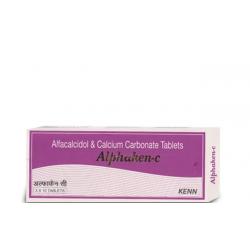
Alphaken-c / Alfacalcidol 0.25 Mcg + El Calcium 200 Mg
Product Details :
Alphaken-C is indicated in
- Management of hypocalcaemia in patients undergoing dialysis for chronic renal failure. It has been shown to significantly reduce elevated parathyroid hormone (PTH) levels. Reduction of PTH has been shown to result in an improvement in renal osteodystrophy
- Post-menopausal osteoporosis.
- Hypocalcaemia in hypoparathyroidism
- Parathyroidectomy
- Vitamin D dependent rickets
- Renal tubular osteocalcaemia
- Sporadic and oncogenic hypophosphatemic osteomalacia
- X-linked hypophosphatemic osteomalacia
- Osteomalacia in Malabsorption syndrome
- Hypocalcaemia and hypomagnesaemia after small bowel resection
- Osteoporosis in males
- Psoriasis